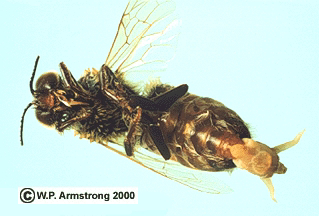Introduction
The male honeybee, called a drone, exists for one reason and one reason only: to mate with a virgin queen. He is entirely expendable after he provides this service to the colony. The drone takes his mission seriously, however, and gives his life for the cause.
How Honeybees Do the Deed
Honeybee sex occurs in mid-air when the queen flies out in search of mates, her one and only "nuptial flight." Drones compete for the chance to mate with their queen, swarming around her as she flies. Eventually, a brave drone will make his move.
As the drone grasps the queen, he everts his endophallus using a contraction of his abdominal muscles and hemostatic pressure and inserts it tightly into the queen's reproductive tract.
He immediately ejaculates with such explosive force that the tip of his endophallus is left behind inside the queen and his abdomen ruptures. The drone falls to the ground, where he dies soon after. The next drone removes the previous drone's endophallus and inserts his, mates, and then dies as well.
Queen Bees Really Get Around
During her one nuptial flight, the queen will mate with a dozen or more partners, leaving a trail of dead drones in her wake. Any drones that remain around the hive in the fall will be unceremoniously driven from the colony before cold weather sets in.
Honey stores are simply too precious to waste on a sperm donor. The queen, on the other hand, will store the sperm for use throughout her life. The queen can store 6 million sperm and keep them viable for up to seven years, with the potential of producing 1.7 million offspring during her lifetime, as she uses a few at a time to fertilize her eggs.
Bee Egg Development
In late winter, the queen then lays eggs in the cells of the hive, up to 1,000 in one day at the height of the season. The hive needs mature bees to be ready to go when flowers with pollen are emerging, but she will continue to lay eggs until fall.
Worker bee eggs mature in about 21 days, drones in about 24 days (from unfertilized eggs), and other queens in about 16 days. The hive needs backup queens in case the queen dies, becomes incapable of laying eggs or is lost because a hive doesn't survive without one.
What Workers Do
In contrast to the drones, female worker bees take on many jobs. They clean cells for eggs to be laid; feed larvae; construct the comb; guard the hive; and forage. They can lay an egg to become a drone if needed, but their eggs can't become workers or queens.





